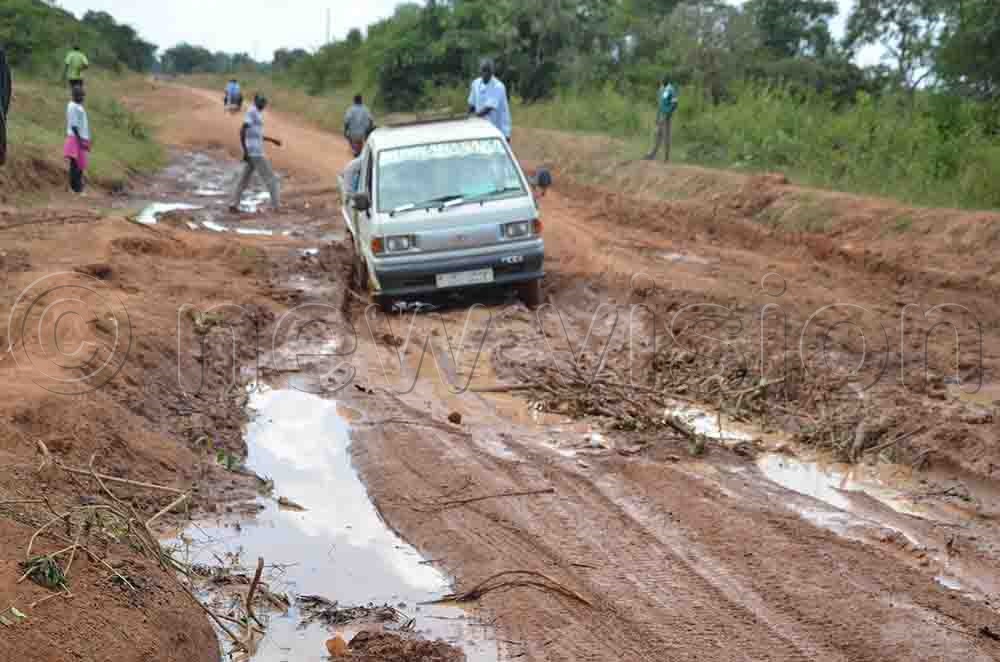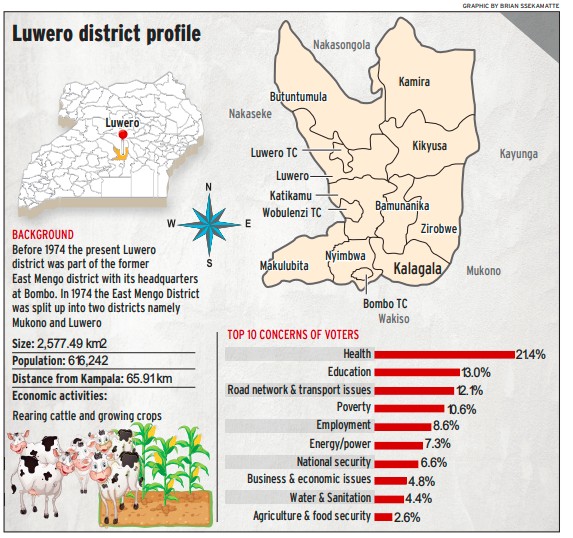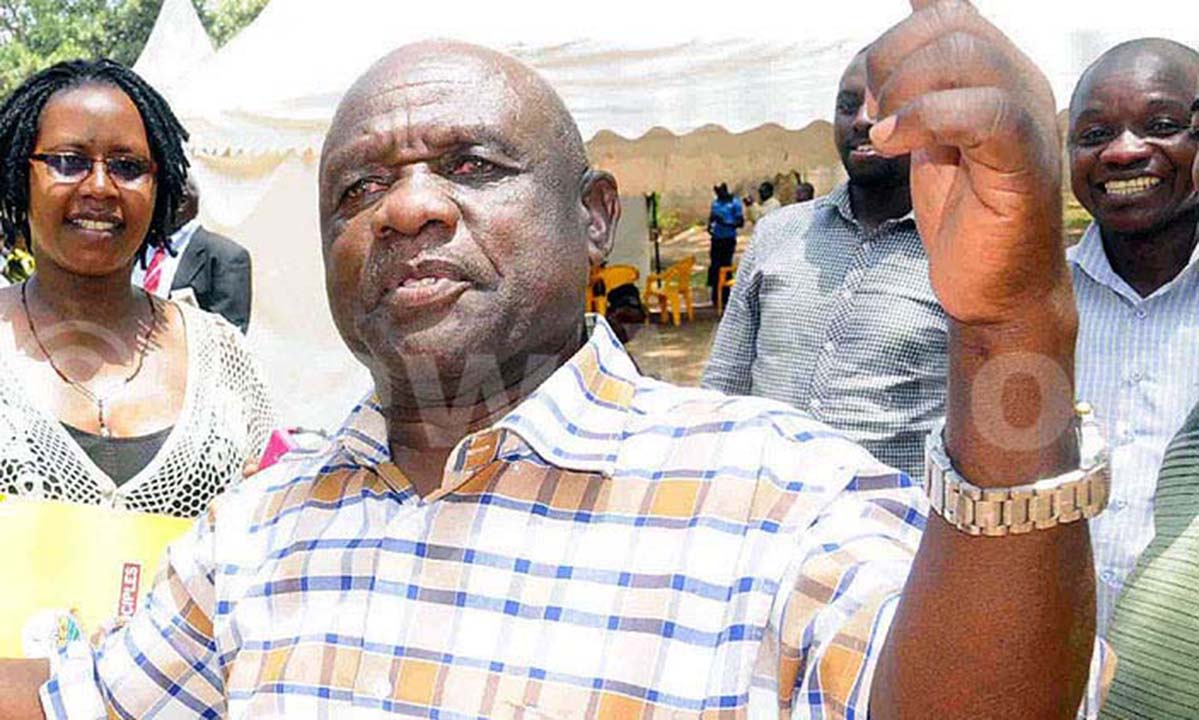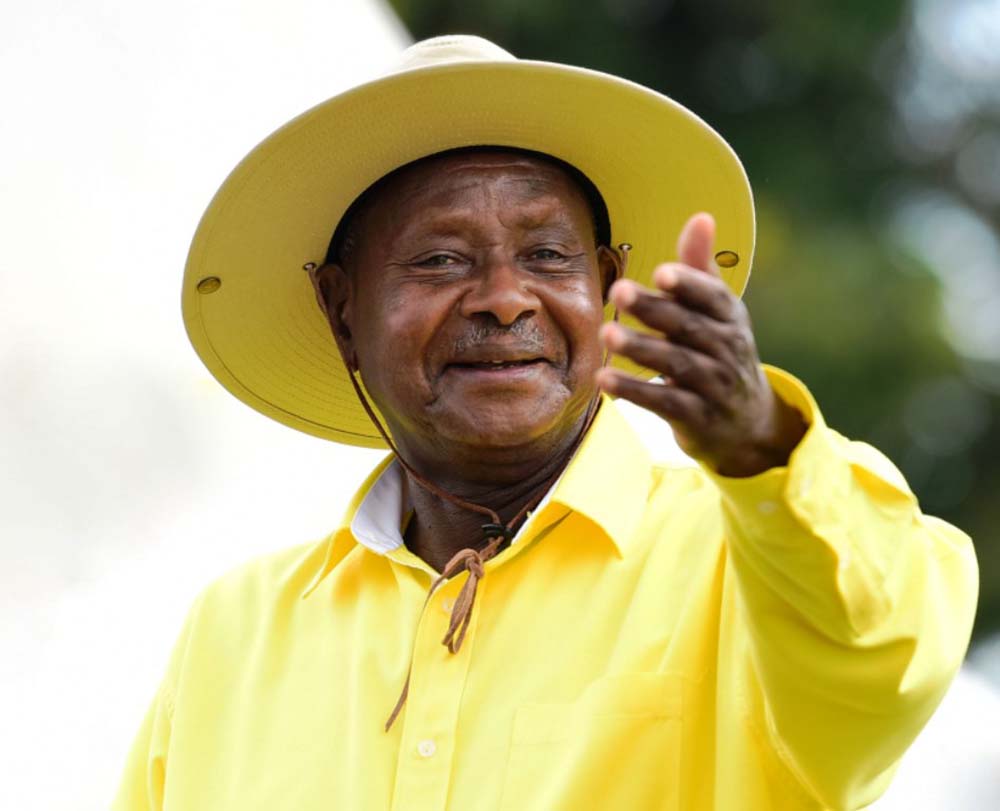Politics
2026 Elections: What voters in Luwero want leaders to address
Poor road network, poverty, unemployment, lack of drugs in health facilities, limited education facilities, limited access to safe and clean water and land grabbing are some of the pressing issues that voters in the area want fixed.
Road users struggle to cross a flooded road near Katambwa swamp in Kikyusa sub-county in Luwero district last year. Some roads in Greater Luwero become impassable during the rainy season. (Credit: Moses Lemisa)
By: Frederick Kiwanuka, Journalists @New Vision

LUWERO - Luwero district has for long enjoyed special treatment from the Government. The area has a state minister, and it has enjoyed rapid industrialisation over the years.
The area is also home to over 500 industries, according to Alice Kaboyo, the Luwero state minister. Luwero Triangle was allocated sh7.161b in the 2024/2025 financial year.
The area hosts the largest tile-making factory in the country. The Goodwill tiles factory and the industrial park produce almost everything, including processed foods, tiles, and electronics.
Namunkekera Industrial Park in Kapeeka holds about 23 large factories employing thousands of people.
The National Enterprise Corporation, the defence ministry production arm, is also located in Nakasongola. However, despite the progress in the area, locals have mentioned pressing concerns that they want leaders to address as the presidential campaigns kick off.

Poor road network
Poor road network, poverty, unemployment, lack of drugs in health facilities, limited education facilities, limited access to safe and clean water and land grabbing are some of the pressing issues that voters in the area want fixed.
Ngoma, a small town in Nakaseke, is one of the major towns in the cattle corridors in Luwero, with many people there directly earning a living off cattle. Recently, Dan Abaho, the chairperson of Buyana co-operative milk group, said a milk cooler was set up in Ngoma.
The excitement among cattle keepers there was visible. However, Abaho said, for the last few months, the community has not fully utilised the new facility due to the poor road infrastructure in the area.
Save for the tarmac at the few bridges, Godson Rwabushande, a seasoned farmer in the area, said: “All these roads are murram and troublesome to use during the rainy season. The smaller feeder roads, including Ngoma-Kanyogoga and Wakyato-Gayaza-Mityomere, are even worse during the rainy seasons, and yet these are key milk- and cattle-producing areas.”
“It is not just about transporting milk, but also cattle to the big abattoirs in Kampala,” Rwabishande said.
Nakaseke North MP Enock Nyongore said the Greater Luwero districts of Nakaseke, Kiboga and Luwero need specific ‘milk roads’ to enable farmers milk financial gains from cattle and other agriculture-related products.
“We have heavy livestock and milk-producing areas like Kijumba subcounty. Tens of trucks go there for milk and cattle, but whenever it rains, the roads become impassable. This is why I request the Government to establish milk roads in this area just like they have constructed oil roads in the oil-producing areas,” Nyongore said.
People's Manifesto
The concerns of voters in Luwero reflect the findings of the Vision group poll conducted between March and May, this year. Some of the sampled respondents in Luwero cited poor road network and health-related issues as the most pressing needs they want their leaders to address.
According to the poll, the voters’ top 12 concerns in Luwero included shortages of drugs and ambulances in health facilities (21%), poor road network (12.1%), poverty (10%), limited education facilities (13%), unemployment (8.6%), limited access to safe and clean water (4.4%), crime activities such as robbery and theft of cattle and other animals (6.6%), limited capital to start businesses (4.8%), power outages or lack of electricity (7.3%), food security (2.6%) and land grabbing (2%).

‘We need dairy roads’
Vianney John Mary Monday — the founder and director of Soul Foods Limited in Ngoma, Nakaseke district — said, much as tackling health-related issues such as easy access to drugs and ambulance services is key, these challenges can easily be solved if the roads in the area are worked on to enable people access markets and money.
“During the rainy seasons, roads become impassable, disrupting the collection and delivery of milk to the market,” Monday said.
On a weekly basis, he said, an average of 50 trucks visit Ngoma for both milk and beef cattle.
“They must drive on either the dusty roads during the dry season or navigate through the mud and floods during the rainy season. The road network is poor, especially during rainy seasons. It becomes very difficult to move produce from farms to the co-operative [Buyana],” Monday said.
There are four major roads into and out of this milk-producing cradle land. To Kyankwanzi district, one breaks off at Bukomero (Kiboga district) and takes the wide, murram road through 70km.
Road connectivity
To connect from Kyankwanzi to Ngoma, there is a short bridge over River Mayanja that was built and tarmacked by the Government over 10 years ago.
Then, from Luwero to Ngoma, one uses the murram road through Butalangu-Wakyato, up to Ngoma. It is about 80km from Luwero town. Other approaches of road transport include Katugo in Nakasongola through Kaweweta to Ngoma or Masindi via the Bulyamushenyi bridge to Ngoma.
Up north, there is Bukwiri after Kiboga to Kyankwanzi. But save for the tarmac at the few bridges, Monday said, all these roads are murram and troublesome to use during the rainy season.
For Pascal Imarachi, a resident of Zirobwe in Bamunanika district, the upgrade of Zirobwe-Wobulenzi road from murram to tarmac is the other vital challenge that must be fixed.
According to the Uganda National Bureau of Statistics (UBOS), the livestock census in Buganda North, where Luwero, Nakaseke, Kiboga, Nakasongola and Kyankwanzi districts are located, indicates them as one of the leading milk-producing areas of the country, with about 750 million litres per year, after Ankole sub-region.
Ankole produces one billion litres per year. UBOS estimated that there are 740,000 cattle in Buganda North.

Alhaji Abdul Nadduli
Jobs, land evictions
Unemployment is the other challenge that voters from the Luwero area have mentioned, saying the Government has to amplify its job creation techniques for the youth.
“We need serious investments that can employ many of our children,” Christine Zalwango, a resident of Kalege [Nakaseke district], said. She said, in urban areas such as Wobulenzi, Luwero, Bombo, Kiwoko, Nakaseke town council and Semuto, “the youth spend days hanging around without work” while others “have resorted to selling land cheaply to earn a living”.
On his part, Hussein Kato, the district councillor for Bombo town Council, said: “Luwero needs special attention, especially in funding of job creation initiatives.”
In light of the matter, Kato said: “The Government should solve the problem of the rampant land evictions. Many of our people have been rendered landless after their bibanja [plots] have been taken by land grabbers.”
To cure the problem of land grabbing and eviction, Kato urged the Government to establish a Greater Luwero region land fund so that “the landlords, most of whom are Kampala-based, are paid off and the tenants are given land titles.”
Regarding unemployment, Kato suggested that, in addition to the increased industrialisation of Greater Luwero, the Government should also establish a skilling centre in the area.
Luwero Triangle state minister Alice Kaboyo said the area has more than 500 industries. She, however, said: “The youth in the area shun working in these industries, forcing factory owners to bring in people from other areas. The young people from Luwero should also be involved and become part of the industrialisation transformation of this area.”

Regarding cattle theft and other criminal activities within Greater Luwero, Museveni called on the Police to operationalise the new policing system of deploying 18 police officers per sub-county across the country.
Over the years, the budget for the Luwero Triangle has been cut, from sh46.199b in the 2020/2021 financial year to sh7.161b in the 2024/2025 financial year. With industries coming up in Greater Luwero, Kampala affairs state minister Kabuye Kyofatogabye said issues of unemployment and poverty have been solved, almost instantly.
“These numerous infrastructural projects, industries and the anti-poverty programmes like Parish Development Model (PDM) have improved household incomes in the region. Above all, we have peace. With peace, everything can be achieved,” Kyofatogabye said.
Health
On the health-related challenges, voters emphasised the need for drugs and not buildings.
Luwero district has over 100 health facilities both private and government, including fully fledged hospitals.
According to the latest Luwero district health performance report, Luwero Hospital stands as the top-performing hospital with a score of 76.7%, closely followed by Bishop Ceaser Asili Hospital at 76.20% and Bombo General Military Hospital at 56.59%. Despite having several health facilities shortages of health workers and lack of medicine in some facilities is a big challenge.
Safe water demands
Rogers Bugingo, a resident of Nakasongola, which is commonly known as the ‘Mecca’ of NRM, also struggles with water-related challenges.

Bugingo says they need safe water.
He said: “The Government, in addition to other services, should provide a solution to the acute shortage of safe water, which is a big challenge in this semi-arid region.”
The veteran question
Haji Abudnoor Kamurali, a veterans’ leader, said the other key challenge in Greater Luwero, is the payment of arrears of veterans.
“Veterans, most of whom are of advanced age, should have their gratuity packages paid. Most veterans are suffering from old age-related diseases and they need care. The Government had promised a special desk at Bombo Military Hospital to treat sick veterans but the promise has never been fulfilled,” Kamurali said.
Kaboyo said, last week, sh6b was released by the Government to to fulfil the gratuity packages to veterans. She said the money is to cover all pending claims in the districts of Luwero, Nakasongola and Nakaseke. The new round of payment came a year after the Government paid sh3b to 1,270 veterans in the three districts last year.
Under the gratuity payment programme, packages are given to those who contributed to the 1981-1986 National Resistance Army liberation.
Museveni's take on Luwero
During his PDM tour of the Luwero Triangle in May this year, President Yoweri Museveni said what needs to be done for murram roads is to grade them and ensure that they are in good shape.
Regarding cattle theft and other criminal activities within Greater Luwero, Museveni called on the Police to operationalise the new policing system of deploying 18 police officers per sub-county across the country.

President Yoweri Museveni
The officers, Museveni said, should be deployed with motorcycles and sniffer dogs.
About poverty and job creation, Museveni told the people of Greater Luwero to recognise that wealth creation requires individual motivation and undertaking, while development is a responsibility of the Government.
About roads, the President recently said, in a statement, that the issue mainly rotates around one word — prioritisation.
How the survey was conducted
The poll was conducted by Vision Group’s research team between March and May, this year, covering a sample size of 6,006 Ugandans countrywide.
They were each asked the question: “In your opinion, which issues are affecting this community?” To ensure national representation, the Vision Group research team sampled eligible Ugandan voters from across 58 districts.
Only citizens possessing a valid national identification card and aged 18 years and above were sampled. The survey covered all 17 sub-regions of Uganda.
The respondents were randomly sampled from both rural and urban areas. Of the total respondents, 2,433 were from urban areas, while 3,573 respondents were picked from rural areas.
According to the survey, majority of the respondents were between the age of 25 and 29 years (1201), and 30 and 34 years (1,058). Only 19 of the total sampled respondents declined to respond to the questions.
New Vision editor-in-chief Barbara Kaija said the Citizens’ Manifesto is a compilation of Ugandan views collected by a team of professional researchers ahead of the national election.
On the credibility of the survey, Kaija said: “This is a scientific survey and it was not influenced by anybody, not even the Government is informed when we are doing this research.
People's voices
Abdul Nadduli, senior citizen and NRA veteran
Over the years, we [Government] have promised so many things to the population, but some of them have not been fulfilled.
Manjeri Namubiru, resident of Kasaala
Although the Government introduced Universal Primary Education, many government-aided schools in Luwero charge extra fees, which are not affordable by poor parents.
Wilberforce Aheebwa, resident of Ngoma
In addition to improving the impassable roads, the Government should assist the predominantly cattle-keeping residents to fight cattle diseases and also avail water.